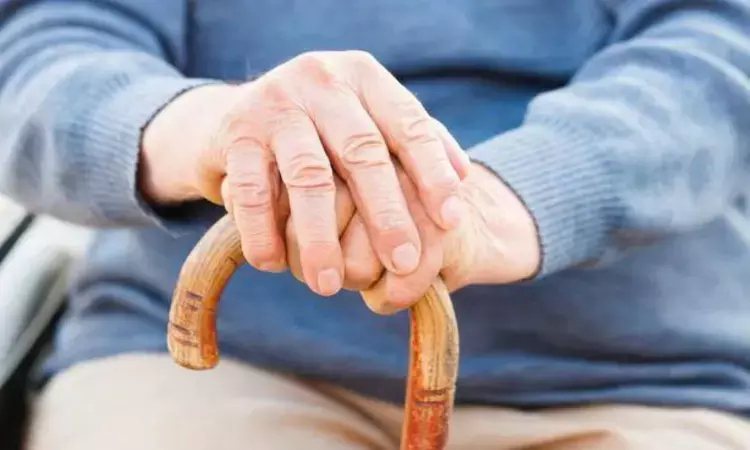- Home
- Medical news & Guidelines
- Anesthesiology
- Cardiology and CTVS
- Critical Care
- Dentistry
- Dermatology
- Diabetes and Endocrinology
- ENT
- Gastroenterology
- Medicine
- Nephrology
- Neurology
- Obstretics-Gynaecology
- Oncology
- Ophthalmology
- Orthopaedics
- Pediatrics-Neonatology
- Psychiatry
- Pulmonology
- Radiology
- Surgery
- Urology
- Laboratory Medicine
- Diet
- Nursing
- Paramedical
- Physiotherapy
- Health news
- Fact Check
- Bone Health Fact Check
- Brain Health Fact Check
- Cancer Related Fact Check
- Child Care Fact Check
- Dental and oral health fact check
- Diabetes and metabolic health fact check
- Diet and Nutrition Fact Check
- Eye and ENT Care Fact Check
- Fitness fact check
- Gut health fact check
- Heart health fact check
- Kidney health fact check
- Medical education fact check
- Men's health fact check
- Respiratory fact check
- Skin and hair care fact check
- Vaccine and Immunization fact check
- Women's health fact check
- AYUSH
- State News
- Andaman and Nicobar Islands
- Andhra Pradesh
- Arunachal Pradesh
- Assam
- Bihar
- Chandigarh
- Chattisgarh
- Dadra and Nagar Haveli
- Daman and Diu
- Delhi
- Goa
- Gujarat
- Haryana
- Himachal Pradesh
- Jammu & Kashmir
- Jharkhand
- Karnataka
- Kerala
- Ladakh
- Lakshadweep
- Madhya Pradesh
- Maharashtra
- Manipur
- Meghalaya
- Mizoram
- Nagaland
- Odisha
- Puducherry
- Punjab
- Rajasthan
- Sikkim
- Tamil Nadu
- Telangana
- Tripura
- Uttar Pradesh
- Uttrakhand
- West Bengal
- Medical Education
- Industry
Frailty tied to 48 percent higher mortality risk in AF patients on anticoagulants

Belgium: A recent study published in the European Heart Journal - Quality of Care and Clinical Outcomes showed frailty as an independent risk factor for death in patients with atrial fibrillation.
NOACs (non-vitamin K antagonist oral anticoagulants) were shown to have better benefit-risk profiles than vitamin K antagonists (VKAs) in patients with frailty, particularly apixaban, followed by edoxaban.
The study showed that frailty versus non-frailty is associated with 48% more all-cause mortality, similar stroke or systemic embolism, and major bleeding risks. Furthermore, NOACs showed superior effectiveness but similar safety to vitamin K antagonists. In comparing non-vitamin K antagonist oral anticoagulants, all NOACs showed similar efficacy; however, less major bleeding was seen with apixaban.
Considering that data on the use of NOACs is scarce in patients with AF (atrial fibrillation), Maxim Grymonprez, Ghent University, Ghent, Belgium, and colleagues aimed to investigate the impact of frailty on AF-related outcomes and benefit-risk profiles of NOACs in frail patients.
For this purpose, the researchers used Belgian nationwide data and included patients with atrial fibrillation initiating anticoagulation between 2013–2019. Frailty was evaluated with the Claims-based Frailty Indicator. Among 254 478 anticoagulated AF patients, 28.2% had frailty.
The study led to the following findings:
- Frailty was associated with higher all-cause mortality risks (adjusted hazard ratio (aHR) 1.48) but not with thromboembolism or bleeding.
- Among subjects with frailty (78 080 person-years of follow-up), NOACs were associated with lower risks of stroke or systemic embolism (stroke/SE) (aHR 0.77), all-cause mortality (aHR 0.88) and intracranial bleeding (aHR 0.78), a similar major bleeding risk (aHR 1.01) and higher gastrointestinal bleeding risk (aHR 1.19) compared to VKAs.
- Major bleeding risks were lower with apixaban (aHR 0.84), similar with edoxaban (aHR 0.91), and higher with dabigatran (aHR 1.16) and rivaroxaban (aHR 1.11) compared to VKAs.
- Apixaban was associated with lower major bleeding risks compared to dabigatran (aHR 0.72), rivaroxaban (aHR 0.78) and edoxaban (aHR 0.74), but mortality risk was higher compared to dabigatran and edoxaban.
"Our findings showed that frailty is an independent risk factor of death," the researchers wrote. "NOACs had better benefit-risk profiles than vitamin K antagonists in patients with frailty, especially apixaban, followed by edoxaban."
Reference:
Maxim Grymonprez, Mirko Petrovic, Tine L De Backer, Stephane Steurbaut, Lies Lahousse, Impact of frailty on the effectiveness and safety of non-vitamin K antagonist oral anticoagulants (NOACs) in patients with atrial fibrillation: a nationwide cohort study, European Heart Journal - Quality of Care and Clinical Outcomes, 2023;, qcad019, https://doi.org/10.1093/ehjqcco/qcad019
Dr Kamal Kant Kohli-MBBS, DTCD- a chest specialist with more than 30 years of practice and a flair for writing clinical articles, Dr Kamal Kant Kohli joined Medical Dialogues as a Chief Editor of Medical News. Besides writing articles, as an editor, he proofreads and verifies all the medical content published on Medical Dialogues including those coming from journals, studies,medical conferences,guidelines etc. Email: drkohli@medicaldialogues.in. Contact no. 011-43720751


